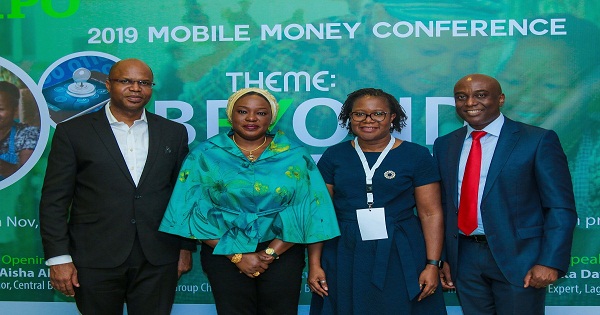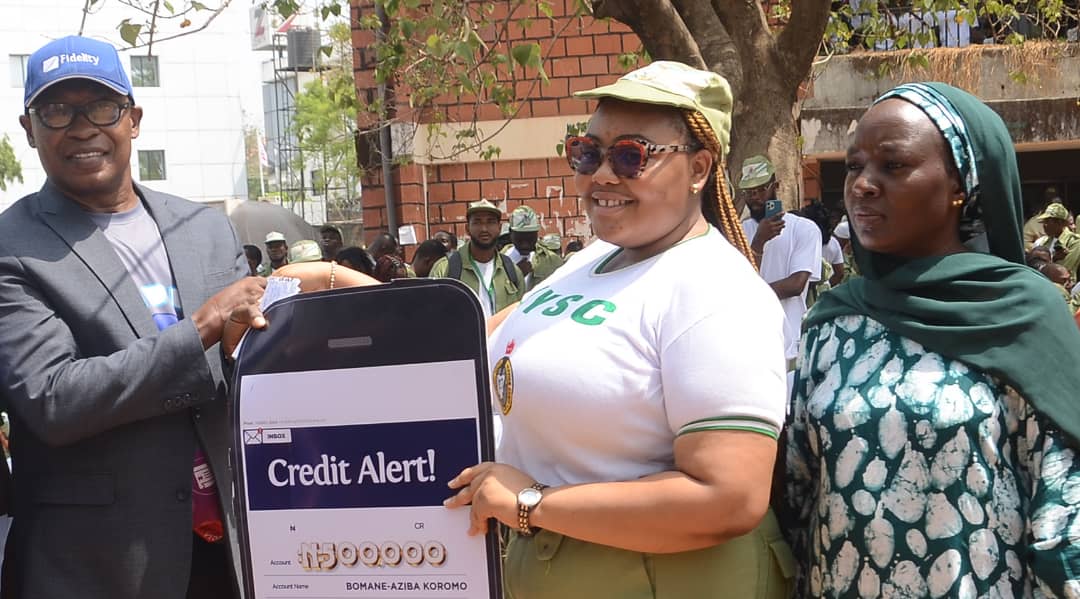E-Financial
How to Deepen Financial Inclusion in Nigeria, by ALMPO Mobile Money Confab 2019

The burden of delivering financial inclusion to the last mile has become one that needs the strategic participation of all industry stakeholders in the ecosystem, so as to deliver value propositions that will deepen financial services culture for the benefit of the citizenry.
These were the views of participants at the 2019 Mobile Money Conference, organized by Association of Licensed Mobile Payment Operators (ALMPO).
The event themed: ‘Beyond Payments’ was held on Wednesday, 27th November, 2019 at Four Points by Sheraton, Victoria Island, Lagos.
Chinedu Onuoha, chairman, Association of Licensed Mobile Payment Operators (ALMPO), noted that the aims of financial inclusion should not be limited to payments alone, that is, paying and receiving of money.
He stated that financial services should be made to cover areas that are germane for the average citizen if we are to achieve the objectives of financial inclusion.
He explained that financial services should be all encompassing and focused on rendering everyday services that go beyond payments services.
According to him, “The theme of this year’s conference aptly captures the general direction of the industry. We are of the opinion, and rightfully so, that for the objectives of financial inclusion to be realized, we must go beyond payments, as we try to attract more people into formal financial services.
“We are aware that the financial needs of the average citizen are much more than pay and receive. People want to save and earn interest.
“They want to participate in pensions, they need some form of insurance, and many more. We also know that for all of this to realized, there must be adequate security and trust in the system.”
Onuoha called for collaboration of security agencies and other government agencies, which according to him, would create the right synergy that will secure the payment system and provide adequate protection to operators as they go about their business.
Aishah Ahmad, deputy governor, Financial Systems Stability, Central Bank of Nigeria (CBN), stated that Mobile Money (MM) is vital to CBN as a regulator and as such, they are open to suggestions on the way forward, without holding on to rigid regulations.
Ahmad who was represented by Aisha Isa-Olatinwo, assistant director, Payments System Management Department, CBN, noted that since estimated reports show that Nigeria has over 100 million unique mobile numbers, if mobile money operations work, there will be over 100 million subscribers.
She enjoined everybody present at the conference to work together to create a success story that will be beneficial to the ecosystem and the entire citizenry.
Uzo Eziukwu, group CEO, BlueTag Group, in a keynote address said that Mobile Money is fast becoming Africa’s legacy to the world, using Kenya’s MPESA as a typical example, doing about 1.7 billion transactions per year and making up to 50% of Kenya’s GDP.
He revealed that there are over 120 Mobile Money Operators (MMOs) in Sub-Saharan Africa (SSA), and they came into Nigeria in 2010 with a focus to drive financial inclusion and as an adjunct to mainstream banking.
He dissected the journey of MM in Nigeria into four stages, according to him, the first stage was the pilot stage between the years 2010 and 2012, which served as linkage of MM into mainstream banking.
According to the Eziukwu, “this was a time to understand the regulatory environment and regulators. This period saw confusion between collaboration and competition.
“This stage saw operators understanding the peculiarities and challenges of the Nigerian landscape. The need to collaborate and align effectively with telcos was also noticed.This stage had the challenges of integration and knowledge sharing”.
The second stage, according to him began from 2013 to 2015, which saw constructive engagement and alliance, as bank and non-bank MMOs engaged with one another and CBN. Also, partnerships arose between MMOs and banks, as CBN further streamlined MM policies.
“These moves saw growth in MM adoptions and in the number of bank accounts, noting also that this stage saw significant growth in MM acceptance driven majorly by the already banked.
He further revealed that innovation in mobile money operation has to be wrapped around consumer needs and not just payments, needs like micro-credits and service-based lending.
He also suggested products to be created for those at the bottom of the pyramid, products like health insurance, micro-pension, interest-based micro-savings, and rotational savings.
Acknowledging that the theme of the conference was apt, he concluded by sharing that as MM is moved forward, the sound benefits of financial inclusion will be unraveled.
Professor Olayinka David-West, academic director, Lagos Business School, delivering a paper Titled ‘Harnessing New Opportunity Areas for Mobile Money Adoption in Nigeria’, decried that only 4% increase in digital payments was recorded since 2016.
She further revealed that out of the estimated 99.8 million adults in Nigeria, only 3.3 million are MM users, and of the 36.8% excluded, most are women.
She reminded that engaging the bottom of the pyramid does more than gaining financial inclusion, but it also enhances the social and economic development of the society.
She also shared that a compelling value proposition is needed to get the attention of the customers. She argued that if the products and services don’t fill the proposition, MM won’t get to the Promised Land.
She also talked about taxes and levies, cybersecurity and fraud, connectivity and power, sharing how the setbacks and challenges in the sectors affect the adoption of MM by the masses.
Mrs Bunmi Ogunlewe, head of Product, e-tranzact, who spoke about shared services platforms as enablers for Mobile Money Growth, said that with the various needs faced by people at the bottom of the pyramid, collaboration is needed to address them.
She advised that the MMOs should come together and build an informed credit system which will help in the journey of MM through the last mile.
She shared that while each MMO collates data, until collaboration is done the data will be useless whereas with collaboration, fresh, enormous, insight will be gotten.
She opined that shared services and shared infrastructure will help get an additional 50 million customers and without shared platform services, the adoption and growth hoped for by MMOs won’t be attained.
The conference had different panel sessions that proffered solutions on how we can reach the last mile and as well set a new agenda for the next decade which will see the implementation of the solutions achieved in driving financial inclusion in Nigeria and indeed Africa.
E-Financial
NCS Raises Concern over Nigeria’s Replacement of Remita

Nigerian Computer Society (NCS) has expressed concern over the Federal Government’s decision to replace Remita Payment Service Ltd with the Treasury Management and Revenue Assurance System.

Dr. Sirajo Aliyu, president, NCS, who spoke a press conference in Lagos, highlighted the potential impact of the decision on Nigeria’s indigenous Information Technology (IT) sector.
Remita, a subsidiary of SystemSpecs Software Technology Group, has provided payment solutions for individuals and organisations for nearly two decades, maintaining a 100 per cent Nigerian workforce. The government’s move, announced on 4 March, has raised concerns about its implications for local IT firms and the wider economy.
Dr Aliyu warned that replacing Remita could send the wrong message to local IT companies, discouraging investment in homegrown technological solutions.
He emphasised that the Treasury Single Account (TSA), powered by Remita, was a fully indigenous project that had been globally recognised for its success.
“We are concerned that this decision could undermine confidence in Nigeria’s IT industry.”
“While the government has the right to make changes, such decisions should involve extensive consultation with stakeholders to avoid unintended consequences,” Aliyu stated.
He added that the TSA had improved transparency, increased government savings, and enhanced operational efficiency in fund management. The sudden replacement of the platform, he cautioned, could disrupt these benefits.
Prof. Charles Onyeukwu, vice-president, NCS, also urged the government to reconsider its decision, noting that Remita had been selected through a rigorous process involving both local and international firms.
He suggested that instead of replacing the system, an Application Programming Interface (API) could be introduced to allow additional service providers to integrate with it.
“We believe a collaborative approach would ensure continuity while enhancing the system’s functionality,” Onyeukwu said.
A memo from the Office of the Accountant-General of the Federation confirmed that the Treasury Management and Revenue Assurance System would be implemented in two phases, starting on 4 March 2025.
The new system is designed to streamline revenue collection and payments across ministries, departments, and agencies.
The NCS, Nigeria’s premier body for computing and IT professionals, has called on the government to engage with Remita and other stakeholders to find a solution that supports both national development and the growth of the indigenous IT sector.
E-Financial
Fidelity Splashes Millions of Naira on Youth Corps Members with GAIM 6

Fidelity Bank Plc has reaffirmed its commitment to financial inclusion, youth empowerment, and promoting a healthy savings culture by rewarding nine National Youth Service Corps (NYSC) members with N500,000 business grants each.

L – R: Branch Leader, Fidelity Bank Plc, Nanka Close, Wuse, Abuja, Vincent Ijioma; GAIM 6 NYSC Empowerment Grant winner, Bomane-Aziba Koromo; and Zonal Inspector, NYSC Zone 3, Abuja, Adama Usman, at the Fidelity Bank GAIM 6 NYSC Empowerment Grant prize presentation ceremony for Q1 in Abuja recently.
The grants were awarded under the Get Alert in Millions Season Six (GAIM 6) promo, an initiative designed to reward loyal customers with cash prizes totaling N159 million.
The promo, which runs from November 2024 to August 2025, targets various categories of customers, including NYSC members, students, and general customers.
Mr. Osita Ede, Divisional Head of Product Development at Fidelity Bank Plc, stated that this season of the GAIM promo aims to enhance the opportunities for loyal customers to win.
“When we launched the GAIM 6 promotion in November 2024, we unequivocally stated that this campaign season is intended to promote inclusivity.
“Consequently, we have increased the total prize money to N159 million and added additional draws, beyond the weekly and monthly draws featured in previous seasons.
“Now, we have specific draws catering to various segments of our customer base including women, students, youth corps members, and traders.
“It is important to note that these categories of customers also stand the chance to win millions of naira in the monthly and grand draws which we will be hosting till 20 August 2025,” explained Ede.
Nine NYSC customers were selected through a random electronic draw in the first quarter of the GAIM 6 campaign, from various branches nationwide. They are: Oluwatosin Emmanuel Olowolayemo and Ekpeno Aniekan George, both from Uyo 2 Branch; Derryk Chidubem Okafor from Trans-Ekulu Branch; Aliyu Idris Adamu from Tudun-Wada Kaduna Branch; Bomane-Aziba Koromo from Nanka Close, Wuse Branch; Asabe Grace Adamu from University of Maiduguri Branch; David Agbai Agwu from Oshogbo Branch; Abdullahi Opeyemi Olajuwon from Airport Road, Lagos Branch; and Eghosa George Orhue from Ado Ekiti Branch.
Expressing his gratitude and excitement, one of the recipients of the entrepreneurship grant, Chidubem Okafor, appreciated Fidelity Bank for the grant, noting that the funds will enable him to achieve his entrepreneurial dreams.
His words, “At first, I thought it was a scam when they introduced the initiative at our orientation camp, but today, I am truly honored to receive this support from Fidelity Bank.
“This grant will go a long way in helping me achieve my entrepreneurial dreams, and I promise to make the most of it,”
Similarly, David Agwu, who also emerged a winner in the draw, expressed his surprise at the unexpected win, saying, “When I received the call, I thought it was a prank. I never applied for anything, so it was hard to believe.
“But when they sent me proof, I realized it was real. I am truly grateful for this opportunity.
“My plan is to invest the money in vocational training and digital skills development, particularly in fashion and painting in order to establish a sustainable business”.
Beyond the N500,000 entrepreneurship grant, the winners will also enjoy free business advisory and training sessions at the newly launched Fidelity SME Hub, located at 22, Lanre Awolokun Street, Gbagada Phase 2, Lagos.
Ranked among the best banks in Nigeria, Fidelity Bank Plc is a full-fledged Commercial Deposit Money Bank serving over 8.5 million customers through digital banking channels, its 251 business offices in Nigeria and United Kingdom subsidiary, FidBank UK Limited.
The Bank is the recipient of multiple local and international Awards, including the Export Finance Bank of the Year at the 2023 BusinessDay Awards; the Banks and Other Financial Institutions (BAFI) Awards; Best Payment Solution Provider Nigeria 2023; and Best SME Bank Nigeria 2022 by the Global Banking and Finance Awards.
It was also recognized as the Best Bank for SMEs in Nigeria by the Euromoney Awards for Excellence 2023 and the Best Domestic Private Bank in Nigeria by the Euromoney Global Private Banking Awards 2023.
E-Financial
Flutterwave Gets Ghana Approval to Offer Inward Remittances

Flutterwave, an African payments technology company, said yesterday it has received approval from Ghana’s Central Bank to provide inward remittance services.

This development, according to the business, reinforces Flutterwave’s aim to simplify payments across Africa. In announcing the development, Flutterwave stated that Ghana’s financial sector is fast growing, with high mobile phone penetration and a vibrant mobile money ecosystem.
Remarkably, it continued, 60% of foreign exchange is received through mobile money platforms, demonstrating the critical role they play in the financial lives of Ghanaians.
Beyond mobile money, areas such as insurtech, lend-tech, and buy now, pay later are expanding rapidly, creating a vibrant and diverse fintech environment, according to the business.
Furthermore, Flutterwave stated that the Bank of Ghana’s supportive regulatory framework and the Ghana Digital Agenda have created an attractive market for fintech innovation.
According to Flutterwave, the latest approval is consistent with these trends, guaranteeing that Ghanaians can benefit from rapid, secure, and cost-effective remittance services.
Olugbenga Agboola, founder and CEO of Flutterwave, commented on the milestone: “Remittances play a vital role in the Ghanaian economy, and our goal is to make the process as seamless as possible for Ghanaians in the diaspora looking to send money home.”
Oluwabankole Falade, chief regulatory and government affairs officer at Flutterwave, added: “We are grateful to the Bank of Ghana for their support and look forward to expanding our services in the country.”

 General News2 days ago
General News2 days agoDaphne Dafinone, CBN GOV’s Ally Facing Alleged N100m Fraud Charges – Police

 News3 days ago
News3 days agoUS Launches ‘Self-Deportation’ App to Streamline Voluntary Exits

 Telecom3 days ago
Telecom3 days agoAirtel Buys Back 66,089 Units of Own Shares

 E-Financial3 days ago
E-Financial3 days agoEFCC Uncovers 58 Ponzi Schemes Targeting to Defraud Nigerians

 E-Business3 days ago
E-Business3 days agoMassive Cyberattack on X Sparks Worldwide Service Disruptions

 E-Financial3 days ago
E-Financial3 days agoReps Ask CBN to Suspend ATM Charges Hike

 E-Financial3 days ago
E-Financial3 days agoPalmPay Partners AfriGO to Issue Over 5m Cards

 Telecom2 days ago
Telecom2 days agoLagos Lawyer Sues MTN, Seeks Dissolution of Board



























